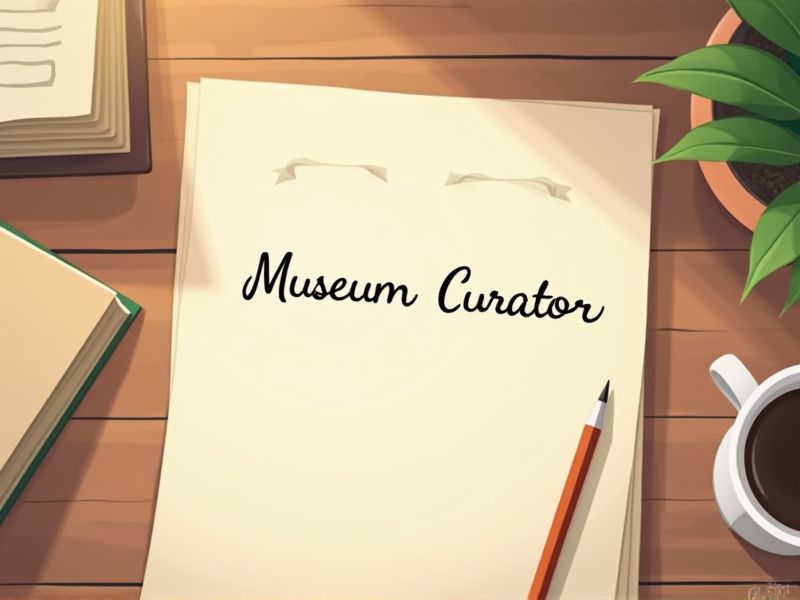
Employing certified museum curators ensures that institutions are managed with expert knowledge and meet industry standards. Certifications demonstrate a curator's proficiency in areas like artifact conservation, exhibit design, and cultural management, instilling confidence among stakeholders. Specialized certifications also open up resources and networking opportunities that are crucial for career advancement in the competitive museum field. Important certifications for a museum curator can significantly impact their professional trajectory and institutional credibility.
Certified Museum Curator (CMC)
A Certified Museum Curator (CMC) ensures that a museum adheres to established professional standards and practices, resulting in better preservation and presentation of its collections. Credentialing through a CMC program enhances credibility and trust with stakeholders and visitors, potentially increasing patronage and support. The rigorous training involved prepares curators to effectively manage artifacts and design meaningful, educational exhibits. Possessing a CMC designation often opens up advanced career opportunities within the museum field, attracting experienced individuals to pivotal roles.
Museum Collections Management Certification
Museum Collections Management Certification equips curators with the necessary skills to efficiently catalog and preserve artifacts, ensuring their long-term care. This certification provides a standardized framework for handling and documenting collections, enhancing curatorial accountability and integrity. Curators with this certification are better prepared to navigate legal and ethical challenges, aligning museum practices with current professional standards. Institutions employing certified curators often see improved exhibition quality and visitor engagement due to the refined curation processes.
Certified Archivist
A Certified Archivist ensures the proper management and preservation of historical documents, which is crucial for a Museum Curator to maintain the integrity of exhibits. Expert archival skills help in organizing vast collections, making them accessible for research and display. Certified Archivists bring specialized knowledge in legal and ethical standards, guiding curators in compliance with cultural heritage laws. Their expertise in digital preservation techniques aids in safeguarding collections against technological obsolescence, supporting long-term museum sustainability.
Certified Art Conservator
A Certified Art Conservator is needed for a Museum Curator because they provide expert knowledge in preserving and restoring artworks, ensuring longevity and structural integrity. Conservation helps maintain the original condition and appearance of pieces, which is crucial for historical accuracy. Proper conservation techniques can prevent or delay deterioration caused by environmental factors like humidity and light. This expertise supports curators in making informed decisions about exhibition and storage strategies to protect the collection.
Museum Education Specialist Certification
A Museum Education Specialist Certification equips museum curators with advanced skills in educational program design, enhancing visitor engagement through more effective learning experiences. This certification ensures curators stay updated with the latest educational methodologies, allowing them to adapt exhibits to diverse audiences efficiently. It validates a curator's proficiency in creating educational content, promoting professional credibility and career advancement. In a competitive field, this certification differentiates curators by demonstrating a commitment to continuous learning and excellence in museum education.
Certified Heritage Interpreter
A Certified Heritage Interpreter enhances a museum curator's ability to communicate the cultural and historical significance of exhibits effectively. This certification equips the curator with techniques to engage diverse audiences, thereby increasing visitor understanding and appreciation. Increased engagement leads to higher visitor satisfaction and potential growth in museum attendance. This expertise also aids in preserving the authenticity and integrity of exhibits through accurate storytelling.
Cultural Resource Management Certification
Cultural Resource Management Certification equips museum curators with the skills to manage and preserve cultural artifacts responsibly. This certification ensures they understand legal and ethical obligations related to cultural heritage. It enhances credibility, leading to better trust from stakeholders and the public. Holding this certification can also improve a curator's ability to secure funding and support for cultural conservation projects.
Certification in Museum Studies
A certification in Museum Studies provides essential knowledge of museum ethics, operations, and artifact handling, crucial for a museum curator's role. It ensures that curators are equipped with best practices for preserving cultural heritage and educating the public. The certification covers skills in collection management and exhibition design, which enhances a curator's ability to showcase artifacts effectively. Having a structured educational background could increase a curator's credibility and opportunities in a competitive job market.
Professional Development in Collections and Conservation
Professional development in collections and conservation equips museum curators with the latest preservation techniques, safeguarding artifacts against decay and damage. Embracing new technologies and methodologies enhances curatorial decisions and exhibition strategies, improving visitor engagement and educational outcomes. In-depth knowledge of conservation practices helps curators balance aesthetic presentation with the longevity of collections. Continuous learning ensures curators can effectively address emerging challenges, such as climate change impacts on artifact preservation.
Certified Conservation Restorer
Museum curators manage collections that often include artifacts needing specialized care, and certified conservation restorers possess the expertise to preserve and restore these valuable items to their best condition. Without the technical skills of a restorer, artifacts could deteriorate, risking the loss of cultural and historical information. Certified conservation restorers keep these artifacts safe, ensuring they remain available for public education and research. Their specialized knowledge supports curators in maintaining the integrity and longevity of museum collections.
Summary
When you obtain certifications as a museum curator, you enhance your expertise and credibility in the field. This often leads to better job opportunities and increased professional trust. Your ability to design and manage exhibits improves, enriching visitor experiences. Curators with certifications may also gain access to a broader network of industry professionals and resources.
